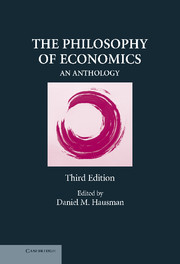Book contents
- Frontmatter
- Contents
- Introduction
- PART ONE CLASSIC DISCUSSIONS
- 1 On the Definition and Method of Political Economy
- 2 Objectivity and Understanding in Economics
- 3 The Nature and Significance of Economic Science
- 4 Economics and Human Action
- 5 Selected Texts on Economics, History, and Social Science
- 6 The Limitations of Marginal Utility
- PART TWO POSITIVIST AND POPPERIAN VIEWS
- PART THREE IDEOLOGY AND NORMATIVE ECONOMICS
- PART FOUR BRANCHES AND SCHOOLS OF ECONOMICS AND THEIR METHODOLOGICAL PROBLEMS
- PART FIVE NEW DIRECTIONS IN ECONOMIC METHODOLOGY
- Selected Bibliography of Books on Economic Methodology
- Index
1 - On the Definition and Method of Political Economy
Published online by Cambridge University Press: 05 June 2012
- Frontmatter
- Contents
- Introduction
- PART ONE CLASSIC DISCUSSIONS
- 1 On the Definition and Method of Political Economy
- 2 Objectivity and Understanding in Economics
- 3 The Nature and Significance of Economic Science
- 4 Economics and Human Action
- 5 Selected Texts on Economics, History, and Social Science
- 6 The Limitations of Marginal Utility
- PART TWO POSITIVIST AND POPPERIAN VIEWS
- PART THREE IDEOLOGY AND NORMATIVE ECONOMICS
- PART FOUR BRANCHES AND SCHOOLS OF ECONOMICS AND THEIR METHODOLOGICAL PROBLEMS
- PART FIVE NEW DIRECTIONS IN ECONOMIC METHODOLOGY
- Selected Bibliography of Books on Economic Methodology
- Index
Summary
John Stuart Mill (1806–73) was born in London, His father, James Mill, was a friend of Bentham and of Ricardo and did important work himself in psychology and political science. As John Stuart Mill explains in his autobiography, he was educated at home by his father, starting Greek at age 3 and Latin at age 8. By age 13 Mill had been through a complete course in political economy. Mill spent most of his life working for the East India Company. His Principles of Political Economy (1848) was the nineteenth century's most influential text in economics, and his A System of Logic (1843) was the century's most influential text in logic and the theory of knowledge. His essays on ethics and contemporary culture, such as Utilitarianism and On Liberty, continue to be extremely influential. Mill was an early defender of women's rights and of a moderate democratic socialism. The following selection is an abridgment of Mill's “On the Definition of Political Economy and the Method of Investigation Proper to It.” Approximately the first quarter of the essay, in which Mill discusses the definition of economics, is omitted.
What is now commonly understood by the term “Political Economy” is not the science of speculative politics, but a branch of that science. It does not treat of the whole of man's nature as modified by the social state, nor of the whole conduct of man in society.
- Type
- Chapter
- Information
- The Philosophy of EconomicsAn Anthology, pp. 41 - 58Publisher: Cambridge University PressPrint publication year: 2007
- 8
- Cited by



